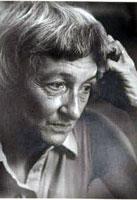White, anti-racist Southerner
Remembering Anne Braden
By
Minnie Bruce Pratt
Published Apr 19, 2006 12:48 AM
Staunch anti-racist activist and white
Southerner Anne Braden died in her home town of Louisville, Ky., on March 6. She
was 81, and had spent her adult life in an unrelenting struggle against racism.
Anne Braden was born in 1924 in Louisville, a descendant of a white
settler family, and raised in Anniston, Ala., in a middle-class, pro-segregation
family. She began her working life as a journalist. She later said her
radicalization came from covering the Birmingham courthouse as a reporter,
seeing first-hand the brutal injustices done to African-American people under a
segregated and racist legal system.
Along with her husband Carl Braden,
she was the central figure in one of the key battles to end segregation. In 1954
they bought a house in an all-white Louisville suburb on behalf of
African-Americans Andrew and Charlotte Wade. The house was dynamited and the
Bradens were arrested under Kentucky state sedition laws passed in 1920 to
support the anti-communist Palmer raids of that era that were being used in the
1950s to support local versions of the national McCarthy witch-hunts. A storm of
red-baiting ostracized both Bradens. Carl Braden was convicted and ultimately
jailed for a year in federal prison. Anne Braden expanded her work against
segregation into a fight against what she described as “the Southern
police state.”
After the struggle for desegregated housing in
Louisville—where she was living with Carl and their three young
children—resulted in the sedition arrests, Anne Braden entered into a
wider campaign that she called the “l950s resistance movement against the
Red Scare.” Fighters against racism in the South were typically smeared as
communists, and threatened with arrest and job loss. Many, like the Bradens,
actually experienced those losses. (Cate Fosl, “Southern Subversive: Anne
Braden and the Struggle for Racial Justice in the Cold War
South.”)
Anne Braden saw that strength and unity in the movement for
social justice could only come with resistance to red-baiting, and joined with
others on the Left to resist this “divide-and-conquer” tactic based
on anti-communism. She refused then, as well as throughout the rest of her long
life, to either claim or disavow an affiliation with a communist party because
she felt to do so would accept the ideology of the 1950s anti-communist
witch-hunts. The integrity of her position is noteworthy because, despite her
commitment to economic justice issues, she did not endorse a specifically
Marxist approach to the analysis of history or to political change in her public
speeches or writings.
During the struggle against the sedition arrests in
the 1950s, Braden went on to join the staff of a civil rights organization, the
Southern Conference Educational Fund (SCEF), resumed her work as a journalist to
edit its newspaper, and traveled throughout the region to recruit greater
support among white people for African-American civil rights. “The Wall
Between,” her 1958 book on the fight to desegregate Louisville housing,
was a runner-up for a National Book Award. A mentor to a younger generation of
activists, she was organized in the 1960s Louisville Open Housing movement and
the 1970s school desegregation movement, Throughout this time she still suffered
from extreme social and political ostracism as the result of red-baiting. In
1967, she and Carl were again charged with sedition for their role in protests
against strip-mining; they were able to use their case to have the Kentucky law
ruled unconstitutional.
Starting in the 1970s, Anne Braden was active in
the Southern Organizing Committee for Economic and Social Justice and was a
founder of the Kentucky Alliance Against Racist and Political
Repression—which formed along with other local branches as the result of
the national campaign to free Angela Davis, then a Communist Party member
charged with helping three imprisoned members of the Black Panther Party to
escape.
Anne Braden was a constant voice for social justice in her local
and regional community, speaking out against police brutality and environmental
racism, and in support of lesbian, gay, bisexual and transgender rights. Her two
“Open Letters to White Southern Women” embody her principled
determination to forge bonds between oppressed peoples. Speaking of the false
accusations of rape of white women that have been leveled against African
American men, she rallied white women to struggle against racism as part of
fighting for women’s liberation, saying, “All issues are
‘women’s issues,’ including war and peace, economics, and
racism.”
Articles copyright 1995-2012 Workers World.
Verbatim copying and distribution of this entire article is permitted in any medium without royalty provided this notice is preserved.
Workers World, 55 W. 17 St., NY, NY 10011
Email:
[email protected]
Subscribe
[email protected]
Support independent news
DONATE


